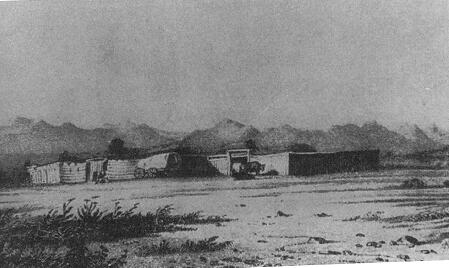
Eliza R. Snow, ever the poet and optimist, writes her account of the first months after settling in the Salt Lake Valley:
Our first winter in the mountains was delightful; the ground froze but little; our coldest weather was three or four days in November, after which the men plowed and sowed, built houses, etc. The weather seemed to have been particularly ordered to meet our very peculiar circumstances. Every labor, such as cultivating the ground, procuring fuel and timber from the canyons, etc., was a matter of experiment. Most of us were houseless; and what the result would have been, had that winter been like the succeeding ones, may well be conjectured.
President Young had kindly made arrangements for me to live with his wife, Clara Decker, who came with the pioneers, and was living in a log house about eighteen feet square, which constituted a portion of the east side of our fort. This hut, like most of those built the first year, was roofed with willows and earth, the roof having but little pitch, the first-comers having adopted the idea that the valley was subject to little, if any rain, and our roofs were nearly flat. We suffered no inconvenience from this fact until about the middle of March, when a long storm of snow, sleet and rain occurred, and for several days the sun did not make its appearance.
The roof of our dwelling was covered deeper with earth than the adjoining ones, consequently it did not leak so soon, and some of my neighbors huddled in for shelter; but one evening, when several were socially sitting around, the water commenced dripping in one place, and then in another; they dodged it for awhile, but it increased so rapidly that they finally concluded they might as well go to their own wet houses. After they had gone, I spread my umbrella over my head and shoulders as I ensconced myself in bed, the lower part of which, not shielded by the umbrella, was wet enough before morning. The earth overhead was thoroughly saturated, and after it commenced to drip the storm was much worse indoors than out.
The fort was built where Pioneer Park, in downtown Salt Lake City, now sits. The fort was  completely enclosed as to protect the pioneers from marauding Indians. This temporary housing served its purpose well, over the winter months, until they could begin claiming, and settling, the land. Her record continues:
completely enclosed as to protect the pioneers from marauding Indians. This temporary housing served its purpose well, over the winter months, until they could begin claiming, and settling, the land. Her record continues:
The small amount of breadstuff brought over the plains was sparingly dealt out; and our beef, made of cows and oxen, which had constituted our teams, was, before it had time to fatten on the dry mountain grass, very inferior. Those to whom it yielded sufficient fat to grease their griddles, were considered particularly fortunate. But we were happy in the rich blessings of peace, which, in the spirit of brotherly and sisterly union, we mutually enjoyed in our wild mountain home.
Before we left winter quarters, a committee, appointed for the purpose, inspected the provisions of each family, in order to ascertain that all were provided with at least a moderate competency of flour, etc. The amount of flour calculated to be necessary was apportioned at the rate of three-quarters of a pound for adults and one-half pound per day for children. A portion of the battalion having been disbanded on the Pacific coast, destitute of pay for their services, joined us before spring, and we cheerfully divided our rations of flour with them, which put us on still shorter allowance.
Soon after our arrival in the valley, a tall liberty pole was erected, and from its summit (although planted in Mexican soil), the stars and stripes seemed to float with even more significance, if possible, than they were wont to do on Eastern breezes.
The following poem was written by Eliza R. Snow. One of so many stirring and thoughtful masterpieces she left behind.
I love that flag. When in my childish glee-
A prattling girl, upon my grandsire’s knee-
I heard him tell strange tales, with valor rife,
How that same flag was bought with blood and life.
And his tall form seemed taller when he said,
‘Child, for that flag thy grandsire fought and bled.’
My young heart felt that every scar he wore,
Caused him to prize that banner more and more.
I caught the fire, and as in years I grew,
I loved the flag; I loved my country too.
There came a time that I remember well-
Beneath the stars and stripes we could not dwell!
We had to flee; but in our hasty flight
We grasped the flag with more than mortal might;
And vowed, although our foes should us bereave
Of all things else, the flag we would not leave.
We took the flag; and journeying to the West,
We wore its motto graven on each breast.
Story taken from The Women of Mormondom by Edward Tullidge